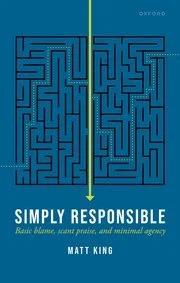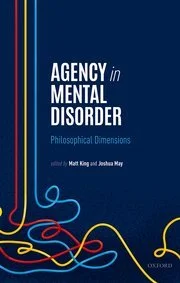Summary
Most of my work is organized around the nature and role of responsibility. I'm interested to see how much can be explained with more modest resources than are typically acknowledged, while challenging widespread theoretical assumptions. In pursuit of these goals, my work explores topics in ethics, the philosophy of mind, the philosophy of action, and law.
Books
My latest book defends a general theory of responsibility. It’s called, Simply Responsible: Basic Blame, Scant Praise, and Minimal Agency (OUP). We evaluate people all the time for a wide variety of activities. We blame them for miscalculations, uninspired art, and committing crimes. We praise them for detailed brushwork, a superb pass, and their acts of kindness. The aim of my project is to show that these commonplaces provide the locus for an explanatorily powerful general theory of responsibility. Focusing on the wide range of things we do and the ways in which we are evaluated for having done them reveals a basic responsibility relation: to be responsible for an action or outcome is for the agent to be evaluable by the lights of the action or outcome. Those actions and outcomes can be evaluated by a variety of standards, yielding good and bad outcomes per the relevant standard. Moral responsibility is thus not a kind of responsibility – to be morally responsible is just to be responsible for something that is morally evaluated. We are also responsible, in just the same way, for the products of our artistic and athletic pursuits (and lot more besides).
This book is excellent. The fundamental proposal is elegant and powerful, and the writing is beautiful…King identifies a core notion, "basic agency," and shows how we can build out from this single, shared element to accounts of a wide range of different kinds of responsibility…His analysis draws attention to the unity of agency and responsibility…The book is admirable in defending a striking and bold hypothesis that illuminates various issues in the contemporary debates, without getting bogged down in them. Highly recommended!
John Martin Fischer, Distinguished Professor, University of California, Riverside
My first book (with my colleague, Josh May) is an edited volume: Agency in Mental Disorder: Philosophical Dimensions (OUP). While there is some work that touches on the significance of mental illness to agency and responsibility (and a few extended treatments of particular disorders), it only scratches the surface. Most research has been on the appropriateness of blame for individuals with psychopathy or those grappling with addiction, which excludes a wide variety of other rather different psychopathologies. Our volume brings together contributions from both up-and-coming theorists and senior scholars to expand the conversation and push the research in new directions.
Every chapter in Agency in Mental Disorder is philosophically innovative and nuanced in several directions, as well as deeply empirically informed; the volume as a whole is excellent. I predict that it will become a touchstone philosophical text in discussions about agency and responsibility not only in the context of mental disorder but also in general.
Lauren Olin (Ethics Vol. 133, No. 2)
Papers
My published papers can be found below (roughly in chronological order). Where they are penultimate versions, their final published counterparts should be available via PhilPapers. Additional work, including some work-in-progress, can be found on Academia.
Responsibility and Consciousness
Oxford Handbook of Moral Responsibility (2022)
It is natural to think that consciousness is in some sense required for responsibility. A lack of awareness typically excuses (or at least mitigates blame). Meanwhile, the emerging consensus from the cognitive sciences suggests that much of our mental lives is unconscious. This article examines the prospects for a consciousness requirement against the backdrop of these findings. It defends the view that while consciousness is important for responsibility, it is not a necessary condition. Additionally, the article provides a framework for understanding the ways in which consciousness might be relevant for responsibility, and it critically assesses one leading defense of a consciousness requirement. Particular attention is paid to three kinds of case involving unconscious processes: automaticism (like sleepwalking), forgetting, and implicit bias. The article concludes by considering one possible implication of the view defended: that the traditional use of consciousness in marking important divisions of mens rea in the criminal law may be misguided.
Attending to Blame
Philosophical Studies (2020)
Much has been written lately about cases in which blame of the blameworthy is nonetheless inappropriate because of facts about the blamer. Meddlesome and hypocritical cases are standard examples. In this paper, I defend a novel explanation of what goes wrong with such blame, in a way that draws the cases together. In brief, I argue that blaming is essentially an attentive activity, and that, consequently, meddlesome and hypocritical blamers are attending to the wrong things.
Skepticism about the Standing to Blame
Oxford Studies in Agency and Responsibility 6 (2019)
There are cases thought to illustrate that appropriate blame requires special standing. One might lack the standing to blame another because the fault is private and one is a stranger or because one is guilty of the very same offense and so one’s blame would be hypocritical. But despite its prevalence as an explanation of what goes wrong in such cases, the standing to blame itself has been given relatively little attention. The aim of this paper is to cast doubt on the standing to blame. It considers a range of plausible interpretations and, finding each wanting, concludes that those who wish to endorse the standing to blame owe us more by way of a characterization and defense. In raising this challenge, the paper motivates an alternative explanation of the cases.
Moral Responsibility and Mental Illness (w/ Josh May)
Neuroethics (2018)
Most people tend to think that mental illness nearly always mitigates responsibility. Against this Naïve view, we argue for a Nuanced account. The problem is not just that different theories of responsibility yield different verdicts about particular cases. Even when all reasonable theories agree about what's relevant to responsibility, the ways mental illness can affect behavior are so varied that a more nuanced approach is needed.
Against Personifying the Reasonable Person
Criminal Law and Philosophy (2017)
The law often asks fact finders to determine whether a defendant was reasonable in some respect. To help them, it is common to turn to a counterfactual test that personifies the reasonable person. Basically, if the reasonable person would have done the same thing as the defendant (or believed the same thing, or had the same emotional reaction, etc.) then the defendant was reasonable. I argue that this test is a hopeless guide to answering the question of defendant reasonableness, and that this problem gives us reason to abandon personifying the reasonable person altogether.
Tracing the Epistemic Condition
in Responsibility: The Epistemic Condition (2017)
I extend my previous work on rejecting special explanatory mechanisms to account for responsibility done without the requisite control to cases of purported responsibility without the requisite beliefs.
Manipulation Arguments and the Moral Standing to Blame
Journal of Ethics and Social Philosophy (2015)
I examine a range of ways in which blame of another may itself ground criticism, and use those resources to reject Patrick Todd’s recent manipulation argument.
(This paper was the target article for critical discussion at PEA Soup.)
Traction without Tracing: A (Partial) Solution for Control-Based Accounts of Moral Responsibility
European Journal of Philosophy (2014)
‘Tracing’ is an explanatory strategy to account for cases where an agent is responsible despite lacking the (presumed) requisite control over their action (e.g., drunk-driving). Many theorists think we must appeal to tracing to explain certain kinds of cases. I argue that tracing is theoretically dispensible, offering two different strategies for accounting for the responsibility in the cases, neither of which involves tracing.
Two Faces of Desert
Philosophical Studies (2014)
In this paper, I make progress toward understanding why it would follow that being morally responsible for something supports a desert claim. I argue that two prominent approaches to theorizing about moral responsibility do not carry equally plausible commitments with respect to deserved praise and blame.
The Problem with Manipulation
Ethics (2013)
I argue that manipulation arguments for the incompatibility of responsibility and determinism fail as a class. Their success is predicated on a dialectically infelicitous incompatibilist assumption.
Moral Responsibility and Merit
Journal of Ethics and Social Philosophy (2012)
I defend two claims regarding a candidate view about the relationship between responsibility and desert, which understands that desert in terms of a kind of fittingness. First, it does better than extant Fitting Attitude accounts of blameworthiness and praiseworthiness. Second, it has an initial plausibility with respect to informing a general account of desert.
Moral Responsibility and Consciousness (w/ Peter Carruthers)
Journal of Moral Philosophy (2012)
We argue that since theories of moral responsibility should operate with the weakest possible empirical assumptions about the natural world, such theories should be framed in such a way as to be free of any commitment to the existence of conscious attitudes, given the very real possibility that there might not be any.
The Problem with Negligence
Social Theory and Practice (2009)
I critique the common view that negligent agents are responsible for the harms they bring about. I argue that there is no plausible explanation of such responsibility that is unified with explanations of paradigmatic cases of responsibility (in which an agent brings about an explicitly intentional result).

